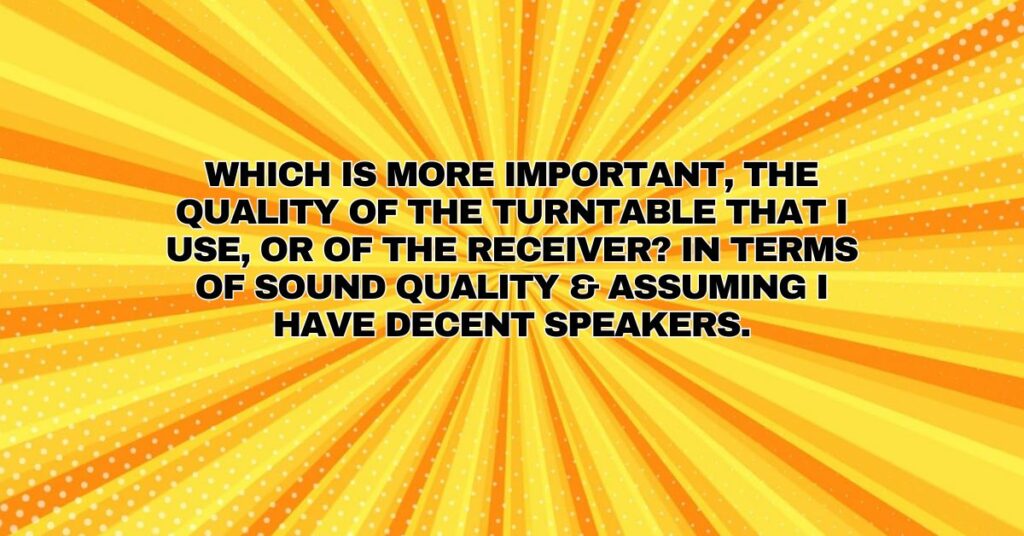When it comes to building a high-quality audio setup for your home, few components are as essential as the turntable and receiver. These two pieces of equipment play pivotal roles in determining the overall sound quality of your music. Assuming you have decent speakers, a critical question arises: which is more important, the quality of the turntable or the receiver? In this article, we’ll delve into the intricacies of both components and explore their respective contributions to sound quality.
The Role of the Turntable
The turntable is often considered the heart of any vinyl-based audio system. Its primary function is to reproduce the audio stored on vinyl records with the utmost precision. The quality of a turntable can significantly impact the sound you hear, and here’s why:
- Tonearm and Cartridge: A high-quality turntable features a well-designed tonearm and a premium cartridge. The tonearm is responsible for tracking the grooves on the record accurately, while the cartridge translates the mechanical vibrations into electrical signals. A precise tonearm and a top-tier cartridge can extract more details from the record, resulting in clearer and more dynamic audio.
- Isolation and Vibration Control: Turntables are sensitive to vibrations, which can introduce unwanted noise and distortion into the audio signal. High-end turntables often incorporate advanced isolation mechanisms to minimize these disturbances. They may include heavy plinths, suspension systems, and vibration-damping materials, all of which contribute to better sound quality.
- Speed Accuracy: Precise speed control is crucial for accurate playback of vinyl records. A good turntable maintains consistent rotational speed, preventing pitch fluctuations that can occur with cheaper models. This accuracy ensures that the music you hear is faithful to the recording.
- Build Quality: The build quality of a turntable can impact its ability to resist external interference and maintain stable playback. Quality materials and craftsmanship reduce resonance and mechanical vibrations, preserving the purity of the sound.
In essence, a high-quality turntable enhances the fidelity of the music by extracting more detail from the vinyl record and minimizing unwanted noise and distortion.
The Role of the Receiver
The receiver, on the other hand, serves as the central hub of your audio system. It receives signals from various sources, amplifies them, and sends them to your speakers. While it may not directly touch the vinyl record like the turntable does, the receiver plays an equally crucial role in shaping your audio experience:
- Amplification: The receiver amplifies the weak electrical signal produced by the turntable’s cartridge. The quality of the receiver’s amplification stage can significantly affect the final sound quality. A high-quality receiver delivers clean and powerful amplification, preserving the nuances of the music.
- Equalization (EQ): Vinyl records are encoded with specific equalization curves, such as the RIAA curve. Receivers often include a phono stage with a built-in RIAA EQ to correct the frequency response during playback. A receiver with a well-implemented EQ stage ensures that the music sounds as intended.
- Input and Output Options: A receiver provides connectivity options for various audio sources, including turntables, CD players, streaming devices, and more. The quality of these input and output stages can impact the overall versatility and convenience of your audio system.
- Signal Processing: Modern receivers may offer digital signal processing (DSP) features, such as room calibration and sound modes. These can enhance the listening experience by optimizing the sound for your specific room and preferences.
Conclusion
In the pursuit of superior sound quality, both the turntable and receiver are integral components of your audio setup. The quality of each matters, and their contributions are interdependent.
If you have decent speakers, upgrading your turntable can yield noticeable improvements in sound quality. A high-end turntable can extract more detail from your vinyl records and reduce unwanted noise, allowing your speakers to shine even brighter. However, a top-notch turntable paired with a mediocre receiver may not fully realize its potential.
Conversely, an excellent receiver can complement the capabilities of your turntable by providing clean amplification, accurate EQ, and versatile connectivity options. It ensures that the signal from your turntable is faithfully reproduced through your speakers.
Ultimately, the importance of the turntable vs. the receiver depends on your specific goals and priorities. If you’re building a vinyl-centric system and crave the purest analog experience, investing in a high-quality turntable is essential. If you seek versatility, room for future expansion, and overall system integration, a top-notch receiver is equally crucial. In the end, the synergy between these components and your speakers is what truly defines the quality of your audio setup.


